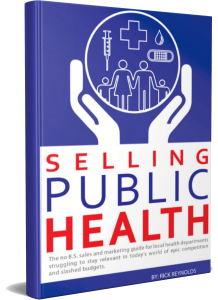Each year it seems some of the revenue streams your agency has counted on are disappearing. This uncomfortable magic is creating a new set of challenges.

Some take the approach of a “thrift” such as cutting expenses, cutting programs, laying off staff and waiving the white flag of surrender. They look around and see others doing the same thing and like lemmings, they are ready to blindly jump off the cliff. Crazy, isn’t it?
Others do nothing and act as if everything is OK. They are either good at ignoring the obvious or they are full of anxiety over the what’s to come next. Some lie awake in bed at night in a state of worry about who they will have to lay off.
The truth of the matter is that in every downturn, bad economy or failure by state legislatures to pass a budget, there are new opportunities created. In addition to opportunities, there is also a change of thinking forced on those that will not accept failure. There were many millionaires created during the Great Depression!

Case in point is Illinois and the mess they went through a few years ago. Their state didn’t pass a budget for nearly two years! The situation that was created by politicians caused public health in the state to hemorrhage quality, long-term public health professionals. Yet, in the midst of this disaster of crappy leadership, some of the health departments actually flourished. Why and how?
When I was invited to come speak at the Illinois Association of Public Health Administrators conference, I was aware of the what they had been through from working with several county health departments throughout the state for many years. I suggested that we conduct a marketing analysis and with the details I develop a case study to create a “Marketing Workshop” for their 94 administrators.
The case study will be addressed in my upcoming book Vibrating Stumps – Why some public health agencies survive and even grow during budget cuts… but I want to share something that will help change the thinking of leaders of non-profits and public health agencies. The Illinois health departments that flourished during the two year stalemate had adapted and learned new ways to increase traffic flow for revenue-generating programs.
You see, many health departments, behavioral health agencies and non-profits are not even aware of the opportunities they are wasting. They have no idea of the lost opportunity cost that for even a small, rural agency can be costing $10-$50,000 per year!
Sometimes it takes a third party, non-emotional participant to spot these lost opportunities. Don’t believe me? Why is it that people that live on a street with a homeowners association don’t have junk laying around their yards and yet some people that live in the country with acres of land tend to have junked and rusted cars in their yards? It’s because they have become unaware of their situation. There is nobody giving the rural homeowner an objective view so they tend to not care too much how their yard looks.

The same thing is true in public health. If you are reading this article, I would bet a cup of coffee that your agency has programs and services that could be better promoted. I would bet two cups of coffee that your staff and employees could be taught a simple change in thinking that could create more revenue than you though possible. I would bet a dinner for two, that you have resources and tools right now that you are unaware of. It’s like driving a car with electric windows without ever pushing the button and enjoying the fresh air.
 As I mention in my book Selling Public Health, it is all about using “tracking” to assess your success. One of my clients recently shared a story where she increased the revenue for her health department so much, her boss asked how she was going to handle the increase in business? She answered, “We have increased our revenues with the same amount of effort as before.”
As I mention in my book Selling Public Health, it is all about using “tracking” to assess your success. One of my clients recently shared a story where she increased the revenue for her health department so much, her boss asked how she was going to handle the increase in business? She answered, “We have increased our revenues with the same amount of effort as before.”
Take an objective look at your agency’s programs and services. How could they be marketed to your community? How are you better that your competition? What is your USP (unique selling proposition)?
It’s nice not having to worry each time the budget pendulum swings towards scarcity. It is empowering to see your agency grow in spite of the lost funding and other challenges. It is encouraging to staff, board members and volunteers when they can begin to think strategically with the same vested interest as a for profit business owner.